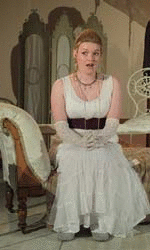Mary Shelley & The Curse of Frankenstein (tour – Woodbridge)
Pat Wymark has written, directed and composed the music for Mary Shelley & The Curse of Frankenstein, premiered and toured by Common Ground Theatre Company.

We first meet Mary (Alice Mottram) as she prepares to elope with the young poet Percy Shelley (Mark Finbow). She's the daughter of proto-feminist Mary Wollstonecraft and the radical philosopher William Godwin.
He's leaving a wife who no longer attracts him as well as the England which he feels has rejected equally his ideals and his poetry.
One way or another, it's a crowded relationship. Claire (née Jane) Clairmont, Mary's step-sister comes too as they racket to and fro across the Channel, ceaselessly ursued by debts and responsibilities.
At one point they settle down, as fa as Shelley's restlessness permits, near the similarly self-exiled Lord Byron (Alfie Harries). It is at Byron's villa, one stormy night, that they all accept the challenge to write a ghost story thrown out by Byron's doctor and companion Dr Polidori (Julian Harries).
The consequence is Frankenstein: The Modern Prometheus. A student attempts to crete new life from a mish-mash of human remains. The Creature calls him "Father", but Frankenstein is revolted by the ugliness to which he has given life and rejects his creation. Outcast, reviled and persecuted, the Creature in turn learns to hate those who will not let him communicate with them, so seeks and takes revenge.
Running parallel to the acted-out events of the novel, we follow Mary's own trajectory of unhappiness – Shelley's insouciant ways of living and loving, the fall-out from Claire's affair with Byron, the deaths of her own children and finally her hsuband (after his wife's suicide mirroring that of Mary's onw step-sister)'s downing in a storm on the Bay of Spezia.
On her return to England with her last surviving son, Mary takes up the task of educating him, maintaining her father and curating her husband's work. Mottram is very good as Mary; you feel and understand her justifiable resentments at being made use of by most of her immediate family and the dilemmas which confront her every move.
Lorna Garside is a sparky Claire, the girl who knows what she wants, grabs for it and then has to watch it slip away. Finbow is also Frankenstein, an interesting pair in more than one way; Alfie Harries is moving as the Creature, like Byron a being at odds with society.
Godwin brings a sharp cameo of blinkered selfishness from Julian Harries; he also plays the on person to show fellow-feeling towards the Creature – an old, blind peasant – Polidori and the mariner who witnesses the final pursuit onto the Arctic ice-floes.
It is a neat dramatic irony that Mary Shelley never profited from the numerous dramatisations to which her most famous work has been subjected. Frankenstein is far better known than his creator.
Mary Shelley & The Curse of Frankenstein tours nationally until 7 August.










